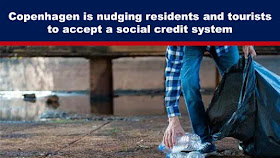The city of Copenhagen, Denmark, has recently introduced a “CopenPay”
system to reward tourists for taking green actions such as using public
transportation or cycling. These rewards include access to cultural
experiences and free vegetarian meals.
It is a climate change-based behavioural modification and social credit system.
CopenPay
is a pilot programme launched by Copenhagen’s official tourism
organisation, Wonderful Copenhagen, aiming to encourage tourists and
residents to adopt “climate-friendly” behaviours. From 15 July to 11
August 2024, 24 participating attractions and businesses in Copenhagen
will reward visitors for taking “eco-friendly” actions.
“There
is a need to change the mindset of tourists and encourage green choices.
Data show a large willingness as 82% say they want to act sustainably,
but only 22% have changed their behaviour,” Wonderful Copenhagen says.
If
people wanted to “act sustainably,” they would. But Wonderful
Copenhagen seems to have not understood this basic concept. So, to
achieve its desires, Wonderful Copenhagen is employing nudge techniques
to get people to change their behaviour.
By now, we should all
be familiar with psychological techniques known as “nudging,” which
emerged as one of the primary tools used against us during the covid
era. But for those who may not yet be familiar, a brief explainer.
Nudge theory aims to influence people’s behaviour through subtle, indirect and non-coercive means. Although as Dr. Robert Malone pointed out,
nudging is a form of psychological manipulation that is often used in
PsyOps and PsyWar campaigns and can border on psychological and even
physical torture.
Below are some key nudging techniques...<<<Read More>>>....
